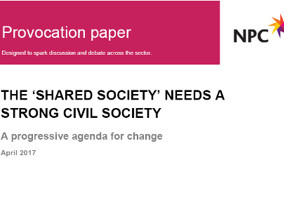Last week the charity sector think tank NPC convened a roundtable to discuss the apparent sideling of charity issues by both main political parties. Kirsty Weakley reports.
There are many complex issues affecting society, and the charity sector is ideally placed to help the government solve them. There's just one problem: the government. It isn’t listening and either doesn’t care or won’t stump up the cash to do what needs to be done.
This isn’t news. It’s been a recurring theme of discussions in the voluntary sector for some time, as senior leaders, campaigners and policy wonks try to find the best way to get things done.
Brexit has arguably made it harder to get the attention of ministers, but are there other reasons that charities have been shut out of key discussions? And what should charities do about it?
‘Government thinks of charities as troublemakers’
Part of the problem is that, rightly or wrongly, Conservatives appear to view charities as adversaries.
Stephen Hale, chief executive of Refugee Action, said there is a perception within government that charities “cause trouble”, are “run by ex-Labour advisers” and “all they do is complain”.
He said: “Until we can explain in one sentence why civil society is a good thing, there is not really much point having 58 solutions.”
Part of the problem, he said, is that the “Prime Minister can’t tell the difference between Save the Children and others”.
‘We’re not relevant’
But perhaps even worse, politicians increasingly struggle to understand why they should engage with charities.
Andrew O’Brien, head of policy and engagement at the Charity Finance Group, said charities had “lost relevance” to both the Conservatives and Labour, with the Tories focused on making “business more responsible” and Labour focused on returning control to the public sector.
He said politicians, particularly Conservatives, hadn’t seen any political benefit to supporting charities in their constituency.
‘Be more radical’
Dan Corry, chief executive of NPC, called on charities to argue their cases better and “be a bit more pointed” to make government listen.
He suggested that the sector’s “asks are not radical enough at the moment”, and said it is vital that more is done to put the sector “centre stage” so that it isn't seen as "residual".
He added that sometimes it is important to "pursue things even when the probability of them happening is very small", because "even the debate is important".
Earlier this year, Corry co-wrote a "provocation paper" calling for the separation of the regulatory and advice functions of the Commission, a review of charity tax breaks, and the civil society minister to be made a Cabinet-level role.
Vicky Browning, chief executive of Acevo, suggested that Brexit presents an opportunity for charities to reach out to some MPs who might be “sitting around with very little to do”. She said that most of them came into politics “to make change”, and advised charities to get in at that point and say "all this stuff is happening over here, why don’t you think about this?”
Think shorter term
The focus on Brexit and the current political instability means politicians are not thinking long term, so charities should make sure that they are framing their asks shorter term. O'Brien suggested that the sector should think more in terms of two or three years.
Corry said that it will be telling how the government uses the latest dormant assets money - they could put it into something long term, like Big Society Capital, or just “splash out” on something more visible.
Charlotte Ravenscroft, interim head of policy at the Association of Charitable Foundations, highlighted that in Wales the Wellbeing of Future Generations Act has meant "all public bodies are supposed to have civil society representation on them”, which is leading to better thinking about “solutions for the longer term”.
Government loves community projects
Conservative MPs might not like charities much, but they do like community projects (even if they happen to be run by charities).
Hale said: “Even in my area they love the voluntary sector from time to time.”
He said that the reason the Home Office particularly liked one of its projects was because it was about the “community welcoming refugees, not charity welcoming refugees”.
Danny Kruger, former chief executive of Only Connect and senior fellow at the Legatum Institute, agreed and added that while charities “have been squeezed out”, Conservatives are interested in organisations with a “community, bottom up, neighbourhood model rather than a big national charity”.
He said that “special pleading” is unlikely to win much support as the sector has “no right to exist for its own sake”.
What next?
We’re in strange political times, where it does seem that the louder and more outrageous you are the more chance there is of being heard.
But it’s even more important for charities to make sure that they give their messages where they will be heard by getting out of their own bubble and engaging constructively a wider range of people.
This might mean going to events and speaking up, approaching MPs and others they want to influence directly, or just staff following some different people on Twitter who don’t share all their views.
Related articles











